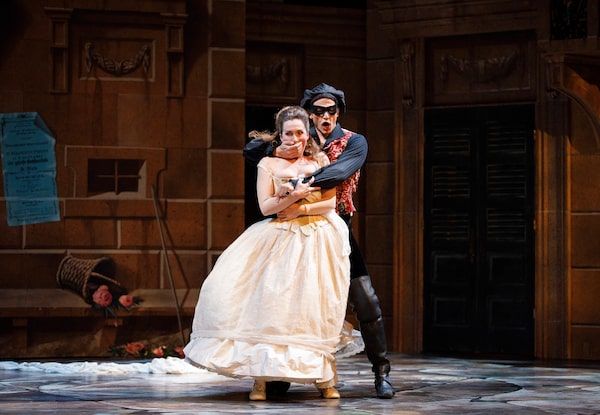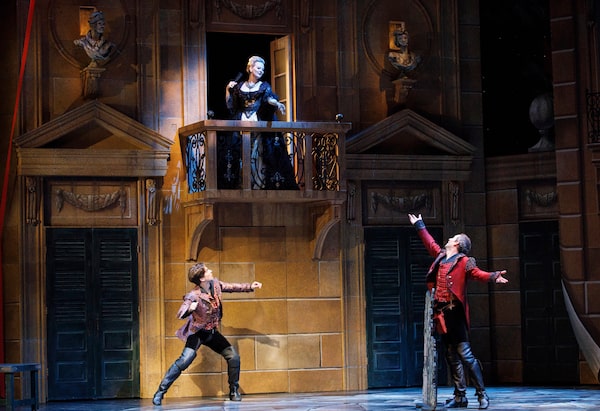
Opera Atelier’s production feels dated in a way that is not a cheeky reference to the company’s baroque specialty.BRUCE ZINGER
Mozart’s Don Giovanni is an opera about grey areas. The piece itself lies somewhere along the spectrum between drama and comedy, not wholly one nor the other. The music, rightly placed up on that pedestal we reserve for Mozart, is malleable; a single aria can dance as easily as it can sulk.
More interestingly – and this is why Don Giovanni is as much a monumental joy as much as an artistic challenge – it is an opera that forces its listeners to have complicated, ambiguous feelings about its characters. Without being annoyingly blunt about it, Giovanni plants in our heads some questions: Does postsex regret amount to non-consent? Does love have to be long-lasting in order for it to be true? Are there permissible lies between spouses? Are women allowed to admit that they like being pursued? Are men beholden to every precoital promise they make? Is a womanizer less offensive if he’s honest about it?
These are the questions that pour from the pages of Don Giovanni’s score, no matter how it’s presented. Opera Atelier, Canada’s leader in baroque opera and ballet, has revived its 2011 production, making a strong case for a Giovanni that is more comedy than psycho-sexual drama. Director Marshall Pynkoski adds in his programme notes, “I think it is particularly important to note that Mozart himself entered Don Giovanni in his catalogue of works as an opera buffa!”
Fine. My disputes aren’t with the balance of comedy and drama; it’s clear that there are indeed both in the score. But in all their respect for “giocoso” and the opera’s nod to the Commedia dell’arte, Opera Atelier reduces these characters to something cartoonish, a mile across and an inch deep. At times it’s shallow, elsewhere it’s lazy; the great cost, though, is to dramatic tension.
There’s no tension in Don Giovanni’s seduction of the new bride-to-be, Zerlina, if she takes zero convincing. This should be our best chance at seeing the Don in action, to understand the skill it takes to lure a young woman away from her fiancé on her wedding day. There’s no tension in the story of fiancés Donna Anna and Don Ottavio. Rather than a compelling push-pull between gaslighting and false rape claims, we get the rather banal arc of Anna’s (consensual) tryst with Giovanni, and her ability to lie to Ottavio, easily and like a sociopath. It’s all much easier to do when you cut Anna’s Act II aria, Non mi dir.
It was particularly depressing to see Pynkoski’s take on Donna Elvira, the woman who fell hard for Giovanni after a night of great sex and romantic promises. Elvira is an amazing character; she’s angry because it smarts to be rejected, and she clumsily seeks some sort of closure from Giovanni, either by revenge or by reunion. Yet in a tension-free belittling of the “woman scorned,” this Elvira is a haughty meddler with a shopping problem. “Look at the stupid woman who fell for Don Juan,” the production appears to say. “What a psycho clinger.” It also helps that Elvira’s final, character-deepening aria, Mi tradi quell’alma ingrata, was cut.

Elvira is an amazing character; she’s angry because it smarts to be rejected, and she clumsily seeks some sort of closure from Giovanni, either by revenge or by reunion.BRUCE ZINGER/Supplied
Distracting stuff. Almost enough to overshadow the excellent performances from the cast. Meghan Lindsay is a gorgeous Donna Anna, a refined foil to the steel in Carla Huhtanen’s thrilling Donna Elvira. As Zerlina, Mireille Asselin makes even spousal disrespect look cute. Stephen Hegedus is a whip-smart Leporello with perhaps Canada’s fastest patter. And Douglas Williams seems as if he is Giovanni incarnate, dashing and fun-loving and young enough to fear nothing.
It’s true that some productions of Don Giovanni wander too far into the realm of sexual predation, often in pursuit of shock value. Opera Atelier’s production sits elsewhere on the spectrum, dated in a way that is not a cheeky reference to the company’s baroque specialty. It’s a bold move to defend Don Juan – particularly so in 2019, a far cry from 2011 – and the company should be commended for leaning into what is the greyest of grey areas in this opera. I just wish it didn’t come with so many heaving bosoms.
Live your best. We have a daily Life & Arts newsletter, providing you with our latest stories on health, travel, food and culture. Sign up today.